Peter MALONE
Saturday, 18 September 2021 19:54
Ninth Guest, The
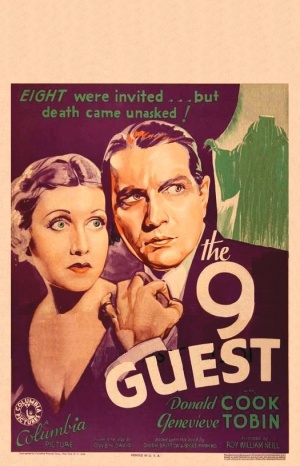
THE NINTH GUEST
US, 1934, 65 minutes, Black-and-white.
Donald Cook, Genevieve Tobin, Hardie Albright, Edward Ellis, Edwin Maxwell, Helen Flint, Samuel S Hinds.
Directed by R.William Neil.
This is one of the many one hour or a little longer second feature films that were so popular in the 1930s and into the 1940s. This certainly is one of the better ones, worth seeing.
Audiences familiar with Agatha Christies Ten Little Niggers Figures/Ten Little Indians/And Then There Were None, may guess what has happened that may have to guess all work out who was responsible. However, Agatha Christie’s story was published five years after this film which is based on a play and a novel by and Davies.
It uses the familiar conventions of old dark house thrillers. While the guests here, eight of them, have to come at night to an appointment at an After Deco home, there is both light and darkness in this house. The film spends a lot of time showing the range of guests and their all receiving a telegram inviting them to the house. We see them once again as they arrive at the house, but this time with more background. None of them knows why they have been invited or who invited them.
When nothing happens, some want to leave, but they find that the doors are locked and electrified and at the time appointed, the voice comes over the radio, threatening them with death. Times are also given for the deaths. The only other characters are a butler and a mysterious yet comic, and drunk character, who is an electrician – and audiences are suspicion of these two.
There is a wealthy man who has manipulated politics, is in league with the seemingly upright doctor, and who is quite bigoted in himself. He uses a ruse in order to poison all the characters – but cuts himself on a piece of metal with the poison and is the first to die. A society woman who has flaunted her snobbery is exposed as a bigamist and kills herself. There is also the editor of the paper, antagonistic towards the manipulator of politicians, arrogant in himself, and he is killed as well as is his wife who runs into the electrification. The respectable doctor, who has urged against the employment of one of the guests, is then murdered, leaving the heroine, suspicious of the two remaining men, wanting to leave, but hearing all the broadcasts from their host.
He explains to them that the ninth guest is death.
One of the men, a journalist was devoted to the leading lady and has grown up with her, begins to unravel some of the clues, especially finding that the radio broadcasts were actually recordings set to play at specific times. The murderer is clearly one of the two men but the journalists is able to unmask the man who did not get his job at the University, who is infatuated with the leading lady, and has grudges against all those who have been killed. He says he would play fair and not kill anyone who worked out to the murderer was – and he goes to his death.
The work of the character actors who dramatise their complicated lives is more impressive than the performances of the leads. The screenplay is quite ingenious in its way, making sure that all the angles are covered, the gates being electrified, no way out, the working of the radio and the broadcasts…
The film was directed by Roy William Neil was to go on to direct most of the Basil Rathbone- Nigel Bruce Sherlock Holmes films during the 1940s. He died in 1946 just as the Sherlock Holmes series was ending.
Published in Movie Reviews
Published in
Movie Reviews
Tagged under
Saturday, 18 September 2021 19:54
Once Upon a Time in Vietnam
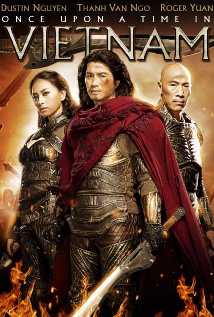
ONCE UPON A TIME IN VIETNAM
Vietnam, 2013, 105 minutes, Colour.
Dustin Nguyen, Veronika Ngo, Roger Yuan.
Directed by Dustin Nguyen.
This film is an example of the developing industry in Vietnam itself. The star and director of this film is Dustin Nuyen, who left Saigon on the day of the fall, a boat person to the United States, where he established himself in film and television.
He has written and directed this film as well is starring in it.
The once upon a time is drawn on as a child describes his mother’s storytelling with illustrations. However, the time in this Vietnamese society is a mixture, seemingly of the 19th century or earlier, the era of the Emperor, but there are some modern aspects of the film, especially the presence of motorbikes and trucks. Which means that we are looking back at Vietnamese history but with a contemporary viewpoint. At some moments, especially the trucks going along the highway, the film is reminiscent of Mad Max films.
The film relies a great deal on martial arts and martial arts battles, strong performances, choreography, effects.
The hero is one of those Man of No Name types, wandering the Vietnamese landscapes, often vivid, desert, with an emphasis on impression rather than realism. He is on a mission from the Emperor, tracking down people who have deserted from the Army and executing them. This is very quickly seen in an early sequence where a man playing a musical instrument is praised for his skills. He continues playing when the hero enters but the rest of the people in the tavern are alert and make their escape as soon as possible. There is an elaborate fight, with the hero inclined to spare the man’s life but he is executed by a General who is keeping track of the hero.
Commissioned to do further work in seeking out deserters, he travels the countryside, encountering a strange range of characters, some from the 19th-century, some looking exceedingly contemporary. He does become involved in quite a lot of fights.
Eventually arriving at a village, with the commission to take care of the village, he discovers that the wife of a baker, a respectable citizen in the town, although he is being harassed by thugs who pressurise him to sell his business to the local Lord – which he refuses. It turns out that his wife is one of the deserters. The hero recognises her, has felt for her in the past, and is torn between shielding the village and helping her or carrying out his task.
This leads to some drama, some more fights, the general who is following him turning up, leading to a confrontation between the two, the safety of the woman, the safety of the village.
The film is reminiscent of a number of Hong Kong and Taiwanese action dramas. With its strange landscapes, time zones, and the photography of the landscapes, it is very much reminiscent of the Korean film, The Good, the Bad and the Weird.
Published in Movie Reviews
Published in
Movie Reviews
Tagged under
Saturday, 18 September 2021 19:54
Legend of Hercules, The
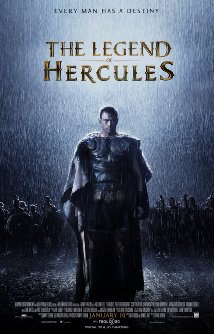
THE LEGEND OF HERCULES
US, 2014, 99 minutes, Colour.
Kellan Lutz, Gaia Weiss, Scott Adkins, Roxanne Mc Kee, Liam Garrigan, Liam Mc Intyre, Rade Serbedzija, Jonathon Schaech.
Directed by Renny Harlin.
The Legend of Hercules would have to be one of the films that has received the worst reviews ever, unanimously. It is really not worth seeing. The producers mistimed the making of this film because Brett Ratner’s Hercules, starring Dwayne Johnson, was released soon after too much better reviews, not only because of the screen personality of Johnson but also for a very strong British supporting cast as well as action scenes and special effects.
Kellan Lutz, one of the actors in the Twilight series, plays Hercules with a certain amount of earnestness. Gaia Weiss is the Princess with whom he is in love. Rade Serbedzija is the wise man, Chiron.
The film starts with battles in Argos, 12,000 BC, a vengeful King defeating the King of Argos in single combat with tens of thousands of extras (computer-generated) as the supporting armies. In fact, computer generation seems to be the important thing with this film, the colour photography, reminiscent of the 300 films looks quite stylised in texture and the images are often those of the computer games rather than of films. This gives the film a rather comic-book look, let alone the performances and the dialogue.
There is an explanation of the conception and birth of Hercules, the the announcing of Zeus’ wanting to mate with the Queen and his wife, Hera, acting as a mediator. (This annunciation and the birth of Hercules are a touch reminiscent of the gospel stories of the annunciation to Mary.) As Hercules grows, he is exiled and brought up in another kingdom, with a brother as rival, falling in love with the Princess. When Hercules discovers the truth about himself and the various missions he is to accomplish, he is torn between the Princess and his sense of duty, opting for the sense of duty.
Many viewers complained that much of the plot is similar to that of Ridley Scott’s Gladiator, a hero sold into slavery, emerging from slavery, combating and vanquishing all his foes.
The film was made in Eastern Europe for budget sake, relies so much on computer-generated extras and action, has fairly basic dialogue, and does not really do justice to the legend of Hercules, his hero status as the son of Zeus, his achievements.
Finnish director, Renny Harlin, has worked in Hollywood for a quarter of a century, making films in the Die Hard franchise as well as Nightmare on Elm Street. Other films include The Long Kiss Good night, Cliffhanger, Cutthroat Island.
Better to see Ratner’s version with Dwayne Johnson.
Published in Movie Reviews
Published in
Movie Reviews
Tagged under
Saturday, 18 September 2021 19:54
Her
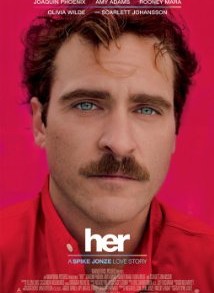
HER
US, 2013, 126 minutes, Colour.
Joaquin Phoenix, Scarlett Johansson, Amy Adams, Rooney Mara, Chris Pratt.
Directed by Spike Jonze.
It was not a surprise when Spike Jonze’s film won the Golden Globe for Best Screenplay. Jonze made an impression some years ago with his films about identity, Being John Malkovich and Adaptation.
This time he goes into the not-too-distant future. It looks very much like our own time – and especially with people, so many people, walking the streets and talking into some kind of communications implements. To capture this atmosphere, the exteriors of the future city are those of Shanghai in the present, with some locations in Los Angeles.
And why the title, Her?
It is best to first consider the hero of the film, Theodore Twombley, Teddy/Ted to those close to him. The trouble is that there are not too many people close to him. At the opening of the film, we see him telling a story into a computer, a sad letter which we find he is composing for a client, working at the company bestletters.com. He has some contacts which with his fellow workers, especially Paul who always praises him and his work. But, as he goes home, we realise he is in the middle of a divorce, his wife wanting him to sign the papers. He has a son whom he loves. And that is about all.
Teddy sees a huge billboard advertising a computerised Operating Service, providing a voice and intelligence as some kind of assistant or companion. Teddy signs up and is given Samantha, Sam, who proves herself not only a companion, an intelligent friend, but someone who is exploring her own identity even though she is an artificial intelligence. Teddy begins to rely on her more and more, talking with her, listening to her, sharing her personality and vitality, and falling in love with her.
Most of the film is taken up with this growing friendship and love, a growing intimacy, sexual awareness. The film is unpredictable, the audience not sure where it might be going in terms of Teddy and his identity, his humanity, his love. And the audience is not sure how Sam will develop and how human she could become.
We are very conscious now of how people rely on mobile phones, texting, continually communicating with people who are not physically present and how that has repercussions on what they are actually doing, saying, sharing with the people who are with them. Her takes for granted this kind of communication (most people in the film, in the streets, in buildings, are busy talking but not to anybody physically with them). What will it be like in the future with the developments in technology and the developments in robotics as well as artificial intelligence? Will humans be the better for all of this? More human? Better communicators?
While these issues are being explored and the audience thinking about them, the film invites us to share Teddy’s life and experience, his ordinariness, his sense of failure, the support that Sam gives him and the power of her transforming him. And questions are raised about the personalities of the artificial creations, with all the semblance is of humanity and intelligence.
Joaquin Phoenix gives one of his best performances, being on screen for all the scenes, communicating by his body language, his silences, the intensity of his inner feelings, who Teddy is and what he is longing for. For most of the film, Phoenix is interacting with an off-screen voice. Scarlett Johansson provides the voice of Sam, and is compelling. Amy Adams plays a close friend, a sympathetic sounding board for Teddy.
Once more, Spike Jonze contributes an interesting and tantalising exploration of contemporary men and women, the technologies of the 21st century and the challenges, creative and potentially destructive, of how human beings can be.
1. The title, arresting? Her being a voice, a machine, simulating humanity?
2. The future, the look, colourful, the city (using Shanghai locations as well as Los Angeles) offices, apartments, the beach, outings? The songs, the musical score?
3. A plausible future, technology and development? Personalised? Those living alone, loners, the possibility of communication, talk, Her, with emotions as real and programmed?
4. Ted Twombly, Joaquin Phoenix and his performance, his face, close-ups, his work, writing the first letter, the tenderness, his age, experience, his past relationships and the collapse, his friends, sharing, alone, the letters and their effect, the recipients? Paul’s reaction in praise? At home, the technology, the voice commands, comfort?
5. Information technology, development, verbal commands, choices of music, emails? Friendship with Amy? Technology and the masculine voice, the forecast for the future, the metro, pregnancy photos? The screens, the games, the holograms? Sleep and voices? The dead cat in the dream?
6. Ted’s memories, his relationship, love, sex? Ted wandering, the city, the video panels and advertising voices? The advertisements for OS? AI, Ted’s needs, interviews online, the psychology of the voice, Her being initiated?
7. Sam, the voice, conversation, pleasant, her choice of her name, 180,000 names? The speed of the thinking, options per second? Hearing Ted’s tone, the explanations, her being intuitive, issues of DNA, Sam and her growing, evaluating, asking for information, looking through Ted’s hard drive, the deletions…?
8. Amy as a friend, chatting, sugar, her husband?
9. The computer game, the character, insulting tend, ‘fuckface’, the games and moves, conversations? Crass?
10. The setting of the date, awkward, Sam concerning the date, Amy and her husband, the plans, Amy’s own work, film and art, screen panels, performance, dramatising dreams?
11. The more intimate talk, Ted and his divorce, Sam being playful, describing the cafe family, and empathy with the passers-by, Sam and fantasy and the walk, on the beach, Ted observing people? The tensions?
12. The date, the setup, her personality, the chat, the initial kissing, Ted and his making? She seeing him as a creepy dude? His talk with Sam about his feelings? Her affirmation? Her feelings, her being hurt to think that this was only part of the pre-programming? The issue of the her wants, the change in Sam?
13. Sam and her ability to want, playing, the escalator, the beach? The ironic comments about physiology, Venus, elbows, sex, drawing, Sam’s composing music? The speed of developments for Sam?
14. Ruminating, thinking the past and his feelings, the letters changing? The further encounters with Paul and his date?
15. Amy, coming to talk with Ted, separating from Charles, the argument about the shoes, pernickety arguments, the separation?
16. His goddaughter, Sam and advising about the dress, the present, a delight?
17. Discussing about perfect moments? His talk with Amy, her interest in OS? Realising that Ted was in love?
18. Further development about the divorce and the interactions of Ted and his wife in the flashbacks, the mutual help in the early days, discussions, his wife’s reaction, as saying that he wanted a wife without having to deal with the realities?
19. Sam, the book club, realisations in the study physics, the body, all matter?
20. Sam and her finding a surrogate of herself, Isabel, the motivations, the relationship, the attempt of the sexual encounter, Ted uncomfortable,?
21. Isabel, the phone calls, the meeting, the talk, sex, speaking Sam’s words? Post sexual difficulties, Isabel humiliated despite tens reassurance, Sam needing time to think?
22. The talk with Amy, reading the letters, Sam being unsettled, developing faster? Ted closing the OS? Becoming more desperate, Sam and the groups, Sam talking to others, 8316 others? 641 in close relationship? Her ability to talk with others while being intimate with Ted?
23. Ted and his book of letters, the space between the words? His being unable to live in Sam’s world?
24. Ted talking with Amy, her situation, their friendship, feelings, the apology, Ted and Amy, two humans together?
Published in Movie Reviews
Published in
Movie Reviews
Tagged under
Saturday, 18 September 2021 19:54
Broadway Melody of 1940
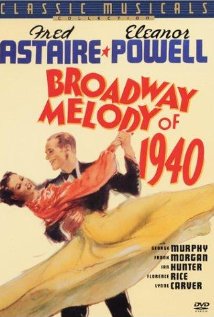
BROADWAY MELODY OF 1940
US, 1940, 100 minutes, black-and-white.
Fred Astaire, Eleanor Powell, George Murphy, Ralph Morgan, Ian Hunter, Florence Rice.
Directed by Norman Taurog.
Broadway Melody of 1940 is a rather conventional musical from MGM at the period. MGM had won an Oscar for best film for Broadway Melody of 1929 and had made variations in 1936 in 1938.
This was the first time Fred Astaire had been at MGM since Dancing Lady in the early 1930s, having made his reputation, especially with Ginger Rogers, in a series of musicals at RKO. This time, he has the dancing leading lady of MGM, Eleanor Powell, who matches him step for step in a range of different dances and routines, and to the music and lyrics of Cole Porter. George Murphy appears as the second string with Frank Morgan as an absent-minded agent and Ian Hunter as a producer.
There are auditions for various vaudeville acts, some of which are very corny and one wonders why they were included. However, a juggling act by Trixie Firschke is very entertaining.
Much of the plot seems to have been borrowed from 42nd Street, the star going on, something to prevent the star continuing, the understudy moving in and having great success. The film was directed by Norman Taurog, Oscar for directing Skippy in 1931. He was to go on to direct a wide range of light films, especially Martin and Lewis comedies and some Elvis Presley musicals.
1. The musical of the 1930s-1940s? MGM production values? Sumptuous sense, sets, fitted, stages, lavish design?
2. The musical score, the songs and lyrics of cold water? Cole Porter?
3. The dancing talent of Fred Astaire, his reputation by 1940, the okay musicals, his career in the 40s, at MGM in the 1950s? A great dance talent? Eleanor Powell, her films, the dancing, the screen presence, cheerful, agile, graceful? In combination with Fred Astaire? In combination with George Murphy and his dancing style?
4. The contrived story, music and song, dance, the variation on the 42nd Street plot? The star, something happening, the underling moving in and being successful?
5. To King and Jack and their friendship, dancing together, then deaths, their hopes, the debt collector, Jack making a mistake, giving Kings name to the agent? The consequences?
6. Casey, watching, escorting the girls, their own coat, the devices to keep it, his devices to get it back? The parody of the gold-diggers?
7. Matthews, relationship with Claire, producing the musicals, and declaring his love, Clare not ready?
8. Waking up King, the audition, Jack’s mistake? His dancing, success? The publicity? The rehearsals? Falling in love with Claire?
9. Claire, sensible, regarding love, regarding career, and dancing? The attraction to King?
10. Jack, realising his mistake, stepping back, coaching King with his dance steps?
11. Jack, at the theatre, watching Claire’s performances, in love, not impeding King? In the dressing room, the dance step, Clare being present, seeing Jack and his complete routine? Her attraction? Joining in? Going out to breakfast?
12. Success going to King’s head, wanting to go out with clay, her develop device of the headache, changing her mind, getting Jack on the phone, King going out, drunk, the rehearsals, Matthews and his annoyance?
13. The night, King drunk, Jack stepping in, the good reviews, sobering up King to go to the rest of the performance? His not remembering? The reviews?
14. King, set, upset, pretending to be drunk, Having to go on, Jack’s success?
15. The happy ending, the three dancing together – and the future?
Published in Movie Reviews
Published in
Movie Reviews
Tagged under
Saturday, 18 September 2021 19:54
Tom at the Farm/ Tom a la ferme
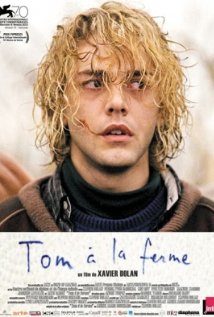
TOM AT THE FARM/TOM A LA FERME
Canada, 2013, 102 minutes, Colour.
Xavier Dolan, Pierre- Yves Cardinal, Lise Roy, Evelyne Brochu.
Directed by Xavier Dolan.
Tom at the Farm was written and directed by Canada’s wunderkind, Xavier Dolan, how not only directed but also acted and contributed costume design as well as English subtitles.
Dolan made a strong impact with his film I Killed My Mother, winning awards and then continuing to have his films screened at festivals, Heartbeats, Lawrence Anyways, and then this film. He was to go on to greater success with his next film, Mommy.
Dolan weaves into his films themes of sexual orientation and this is true of this film, the leading character, Tom, grieving the death of his partner, travelling to visit the family and to give the eulogy at the funeral. It does not quite work out this way, his baulking at giving the eulogy, his ways of trying to comfort the mother, the intimidation of the older brother who seems to be homophobic and is suspicious of his own orientations. Tom who runs an advertising agency becomes somewhat exhilarated by his work on the farm, the milking and, especially, the birth of a calf. There are also complications with the young woman who works at the company and is assumed, because of a photo, the family assuming that she is the deceased’s girlfriend.
Tom does not stay on the farm but goes to some kind of future where the film ends. Dolan himself, while an effective director, is also an effective factor.
1. The work and Xavier Dolan, his age, film experience, writer, director, actor, costume designer, English subtitles?
2. The adaptation of a play? Opening it out? Dialogue? Locations? The musical score?
3. The title, the focus on Tom, the reality of the farm, the background of his lover, its effect on him? Going to the farm, the occasion of death, grief? Work?
4. The drive, the farm landscapes, the visit to the farm, no one at home? Tom’s appearance, hair colour spikes, clothes? Searching on the farm, going into the house, Agathe meeting him, her welcome?
5. Agathe, the mother, her concern for the family, her dead husband, the farm, Francis running the farm, the hard work? Love for her son, his leaving, no communication afterwards? The photo with Sarah? Her hopes about his relationships? The funeral, expectations about Tom’s speaking, his not giving the eulogy, the sadness? The return home, laughing at the sex stories? The meeting with Sarah? Francis, his talking to Tom, while dancing, hoping his mother would die, the possibility of putting her in a home? Her overhearing this?
6. The character of Francis, older, looking on, his not wanting to stay on the farm, the details of the work, the milking, the machinery, the birth of the calf? His threats to Tom, about secrecy, supporting his mother? At the funeral, his anger Tom’s not speaking? Working with Tom on the farm? His skill in dancing, dancing with Tom? His homophobia? Tom the bar, hearing the barman tell the story of Francis and his tearing the young homosexual’s face, and the visualising of this scene scene – and the touch with Tom’s seeing the young man at the service station?
7. Tom, working on the farm, the effect on him, the different experience, hard work, clothes, the shower? With Francis? Hearing the story? His decision to leave?
8. Tom asking Sarah to visit, the pretence for the sake of the mother, the conversations, slip ups, interaction with Francis? Francis and his approach, her wanting to leave? Sexual tension?
9. Tom, the decision to leave, despite his liking the work on the farm, going back to his own work, into the city, the experience, learning about his partner – and perhaps his infidelities?
Published in Movie Reviews
Published in
Movie Reviews
Tagged under
Saturday, 18 September 2021 19:54
Riverside Murder, The
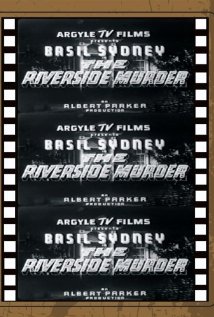
THE RIVERSIDE MURDER
UK, 1935, 64 minutes, black-and-white.
Basil Sydney, Judy Gunn, Zoe Davis, Alastair Sim, Tom Helmore.
Directed by Albert Parker.
During the 1930s and into the 1940s, American studios, some considered Poverty Row studios, made quite a number of interesting short features, second features, which ran about an hour to 70 minutes. This is a British version.
It is very similar to a lot of the American films and to Agatha Christie’s Ten Little Indians. Sometimes there is a dark house, especially in American films, but this mansion is seen in daylight. There is a basic plot about a deal with four men who contribute their finances to a business venture, with the condition that, if one of them dies, his share goes into the pool. Obviously, a motive for murder. And there is, as one of them is feeding his canary. And, little by little, the others are killed or, as Agatha Christie would ask, are they in fact dead.
Basil Sydney is the detective, a certain amount of charm, but not so engaging as a leading man. He was to appear in a number of British films, most notably playing Claudius in Laurence Olivier’s Hamlet. The main attraction, however, is his associate, played by Alastair Sim in one of his earliest roles. Not that it was too different from a lot of his subsequent roles, but his bald appearance, his enthusiasm, the touch of dithering, his enjoyment of working at the case offer a lot more entertainment than does Basil Sydney.
Judy Gunn appears as a social reporter who wants to interview some of the men and decides that this is an opportunity to move from ordinary articles to crime reporting, much to the annoyance of her editor, and seemingly much to the annoyance of the detective – though, at the end, they are seen as a romantic couple.
All in all, except for Alastair Sim, this is a lesser effort than many other similar American films.
Published in Movie Reviews
Published in
Movie Reviews
Tagged under
Saturday, 18 September 2021 19:54
Gambler, The/ 2014
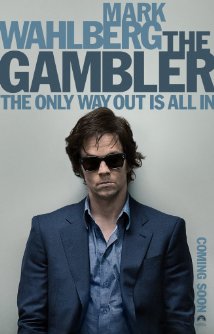
THE GAMBLER
US, 2014, 111 minutes, Colour.
Mark Wahlberg, John Goodman, Jessica Lange, Michael Kenneth Williams, Anthony Kelley, Brie Larson, George Kennedy.
Directed by Rupert Wyatt.
In 1974 there was a rather grim film, The Gambler, written by James Toback, his first screenplay - and he was to go on to direct some rather blunt and grim films. James Caan portrayed the title gambler.
Movie-making powers that be decided that 40 years later it was worth telling the story again. Not so sure!
This is certainly a grim film while it has some very strong credentials, the adaptation of Toback’s script by William Monahan who has written such screenplays as The Departed and directed by British Rupert Wyatt, who made an impact with a very different kind of film, The Rise of the Planet of the Apes. This time Mark Wahlberg is a gambler of the title and there is an interesting supporting cast including Jessica Lange as his mother, Brie Larson as a student with whom he is having a relationship, John Goodman as a more kind-hearted loan shark, Michael Kenneth Williams as the gambler’s nemesis, and a few moments at the beginning of the film with veteran George Kennedy as the hero’s dying father.
Jim Bennett is a professor of literature and we are shown some of his classes, his reflections on Shakespeare, his love of language, the reaction of the students. Bennett is in a compromising position in having a relationship with a student. But he has an even shadowier life in terms of gambling, going to the casinos, not content with to take away any winnings, but seemingly compelled to bet and to bet until he has lost. It seems a kind of death wish.
The casino authorities are wary of him. But a smooth-talking entrepreneur gambler, Neville (Michael Kenneth Williams) interests himself in Bennett, offering lending deals, getting Bennett in his own-shark tentacles. And Bennett allows himself to be caught.
While not winning at the tables, he takes the opportunity to borrow from his mother, a rather hard Jessica Lange who realises that she has alienating her son, but nevertheless goes to a bank to give him access to money. The other source is Frank (John Goodman) who becomes something of a father-figure to Bennett, prepared to support him, but warning him to exercise some gambling prudence.
This all means that Jim Bennett has to face himself, his future, his gambling which he thinks is not an addiction, his relationship with his girlfriend, his dependence on Frank. Rather shrewdly, he works out a way of playing Frank off against Neville, going to a neutral gambling house and playing and playing the house so that his debts might be paid off.
Will they? Will he be able to stop? (And how easy is it to be sympathetic to Jim Bennett as a character for us to want him to achieve some kind of redemption?)
1. A film about gambling? A symbol of other addictions in risk-taking? Death wish?
2. The existential aspects of the film, life, its meaning, self-image, relationships, threats and challenges, defiance? Possible redemption?
3. An American story? The world of the affluent? The world of sports? The world of gambling? The gambling places, the bosses? The contrast with the University, the lecture hall? The streets? Basketball? Atmosphere? The musical score?
4. The prologue, Jim and his dying grandfather, the conversation, leaving money or not? His seeming indifference? The death, the funeral, leaving early? His relationship with his mother?
5. Going to gamble, the amount of cash, getting the chips, continuing to win, ultimately losing? Audience reaction to his character, his gambling, his venturing more money, losing? How much interest? How much sympathy?
6. Neville, watching Jim, the comments about his hat, the conversations, Neville wanting to back him, the money, the 20 points of interest? His thugs and entourage? His personality, observing, interest, risks?
7. The Koreans, the casino, at the tables, the staff, the boss, his demands?
8. Jim and his relationship with Frank, Frank’s organisation, the money loans, but his mentoring, giving advice on having money in reserve? The loan and the final demands?
9. Jim’s mother, coming in to the bath, coming to the house, and with her son, her past life, the bank, his father? The discussions, going to the bank, the interview and her being demanding, getting the cash? Giving it to Jim? Walking away? Her later being seen playing tennis with Dexter?
10. The surprise to find that Jim was a lecturer, English literature, the students and their questions, Lamarr and his mobile phone? Issues of Shakespeare and authorship? The Duke of Oxford and the nature of genius? Dexter explaining his success at tennis and his desires? Miss Phillips, genius, writing, attention on her?
11. Jim and his published book, deprecating himself, issues and genius? Reality?
12. Jim, morose, seeming indifference, his manner of gambling, without emotions? The vivid dreams? His being abducted, tortured, his injuries? Torture wish? Death wish?
13. Neville, his interesting Lamarr, the pressures on Jim, the game and the margin of victory? Jim present, Neville watching on television? Lamarr being sent off? Return, his victory? The threats to Amy? Jim and his relationship with her?
14. Dexter, the return from Las Vegas, bringing the winnings? His refusal to take cash?
15. The mother’s money, but the Las Vegas win? The set-up with the Korean and Frank, both coming to the neutral betting ground? Jim entering, the visuals of the location? Betting on black, not watching? Winning? The payoff to the Korean? To Frank? Jim saying he was not a gambler?
16. The run, his exhilaration, going to Amy’s room? The future?
17. An existential exploration and dramatising of gambling? A cautionary tale or not? The effect on non-gamblers, simply observing? For gamblers – no lesson, perhaps not particularly interested?
Published in Movie Reviews
Published in
Movie Reviews
Tagged under
Saturday, 18 September 2021 19:54
Kingsman: the Secret Service
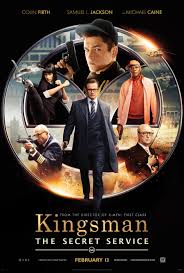
KINGSMAN: THE SECRET SERVICE
UK, 2014, 129 minutes, Colour.
Colin Firth, Taron Egerton, Samuel L. Jackson, Mark Strong, Mark Hamill, Sofia Boutella, Michael Caine, Sophie Cookson, Jack Davenport.
Directed by Matthew Vaughan.
A surprisingly popular film at the beginning of 2015, not only in the UK where it originated, but also in other English speaking countries, including the US.
Writer-director, Matthew Vaughan, and his co-writer, Jane Goodman, have worked on a number of films including Stardust as well as Kick Ass. They draw on graphic novels, finding cinematic equivalents both visually and verbally, hyper-real, colourful, and with touches of parody. This is certainly the same here.
The Kingsman Secret Service organisation allegedly originated at the time of the Napoleonic wars, with wealthy men gathering together and forming this agency for England and patriotism’s sake. As time went on, the organisation went underground, using a fashionable tailor’s store and service as a cover – and, covering quite a bit, as the lift goes down and the underground, as shuttles go through tunnels to open up on a vast arsenal and training facilities for this espionage elite.
As the film opens, and an agent is being held by a deranged scientist, Kingsman agents arrive to save confidently the day, only they don’t. But an apprentice saves the suave and gentlemanly agent, played by Colin Firth, falling into the hands of no, rather, the stiletto shoes of quite a vicious martial arts femme fatale.
The principal action takes place 17 years later, where it is revealed that the Kingsman group models itself on the Knights of the Round Table, with Michael Caine as the leader, Arthur, with Colin Firth’s Harry Hart’s codename, Galahad. Mark Strong, who has appeared so effectively in many films, often as the villain, is the instructor and trainer for Kingsman, codenamed, Merlin.
Harry is on the lookout for further recruits and has his eye on the sound of the agent who saved his life years earlier. The boy, who is called, of all names, Eggsy, (Tamsin Egerton) has had a pretty unhappy life, his slovenly mother taking up with a local brute, his opting out of education despite his intellectual and physical capabilities, running with the local gang. When Galahad arrives to save him, Colin Firth is doing an impersonation both of James Bond as well as John Steed, Patrick Macnee’s top-hatted and caned character in The Avengers from the 1960s. The local toughs are no match for him. Eggsy, meanwhile and his pals have been going around stealing cars, joyriding so Galahad has to rescue him from prison with the guarantee that Eggsy will train for Kingsman.
There is a lot of rivalry amongst the trainees, who really do have a strict regime, the toffs from British public schools looking down on Eggsy. But, they lose.
It is just as well that Eggsy has been recruited because there is our larger-and-life in the offing, a very insane type who might aspire to be a Bond villain, Valentine, who wants to control the population, giving away free Sim cards with implants to rouse anger so that everyone attacks each other and it won’t be too long before the apocalypse. Even world leaders play into his plans and Eggsy’s mother, along with millions of others, lines up for the free Sim card.He is played He is played for laughs and mockery by Samuel L.Jackson – and who should be one of his assistants but the stiletto shoes assailant!.
This leads to a whole series of surveillance sequences, Kingsman and the villain having the technology to spy on each other, a rather dramatic confrontation with unexpected ending in a revivalist church in the United States. But, it is finally up to Eggsy, now a suave personality, and James Bond Jr, to use his wits and the advice of Merlin to drum up a dramatic confrontation with Valentine.
Audiences seem to have enjoyed the paralleling of this film with the Bond films, the elements of parody and spoof, the drawing on the Knights of the Round Table imagery, the fact that so many people are mind-affected, the confrontations leading to potential disaster, and the young hero saving the day.
Lots of action, lots of special effects, lots of humorous dialogue – but, it is probably about time that screenwriters gave us a break from not intermittent, but incessant, crass language which is very weary and offputting to some of the audiences who might enjoy this kind of film – we need a break. And Colin Firth, despite his Oscar, seems very awkward in delivering four letter words!
1. The origins in a comic strip? Content, characters, style?
2. The role of parody, spoof? The tradition of Hero movies, James Bond films, heroes and villains? Expectations?
3. The title, the Secret Service, its history, the 19th century, the Napoleonic wars, the money to class, after World War I, the foundation, very secret? Kingsman, the tailor? The Knights, the Roundtable, presided over by Arthur? Missions, rescues, successes and failures?
4. The action sequences, the elaborate fights, choreography, the deaths? The special effects for each fight? The musical score – and the use of Pomp and Circumstances for the exploding heads?
5. 1997, the mission, the interrogation, the bomber, the agent giving his life, saving Harry? Harry and the visit to the wife, her grief, giving the medal to her son?
6. 2014, Argentina, the abducted Professor, the issue of climate change? Lancelot, arrival, killing the agents? Lancelot and his drink, his death? Gazelle killing Lancelot?
7. 2014, Harry and his life, Arthur and the Round Table, the toast to Lancelot, wearing the glasses for the other members to be visible?
8. Valentine, the movie about him, his announcement on stage, Sim cards for everyone, free Internet? The acclaim, the people queueing for the cards?
9. Valentine and the implants, their effect, the Professor, accosted by Harry, exploding?
10. Valentine, the Swedish Prime Minister, the Princess, accepting and refusing? The implants? The imprisonment and the disappearance of prominent people? Valentine and his wanting to take over the world? By the implants, the rousing of anger and mutual battles?
11. Eggsy, his life, his mother and Dean, the slovenly life? The gangs? Eggsy and his career, and after his mother, her baby, leaving the Marines? His gymnastics and the example from the roof? His studies? Stealing the car, the car chase? the police, jail, his ringing Harry, released, going to the pub, Harry’s explanations, wanting to recruit him? Dean, the attack, Harry in the fight and his finishing his beer?
12. Harry, indebted to Eggsy’s father, taking him to Kingsman, the lift down, the train, the vast plant and weapons and aircraft? The introduction to Merlin?
13. The training, the group, the snobs, Roxanne and her support? The variety of tests and training? Flooding the dormitory, the lack of teamwork, Eggsy and the door, breaking the glass? The shooting training? Choosing the dog and Eggsy choosing the pug? The parachute training, Roxanne and her being afraid, the jump, Eggsy holding Roxanne, landing? The test and the shooting of the dog? Harry stuffing his own pet dog?
14. Eggsy unable to kill the dog? Arthur and his disdain? The ousting of Eggsy?
15. Samuel L. Jackson as Valentine, his lisp, fear of blood? Gazelle? Doing his dirty work? Valentine as the mad villain? The meeting with Harry, putting the
tracer, each side having vision of the activities of the other? The joke about the McDonald’s? meal? Harry going to the church, the congregation all becoming bellicose and fighting, the mayhem? Harry killing everyone? Valentine and his confronting Harry? Killing him?
16. Eggsy and his revenge, working with Merlin, with Roxanne? The plan, to destroy the satellite, Roxanne and the space vehicle, the split-second timing, the exploding of the satellite? Landing on the mountains, in contact with Merlin, phoning Eggsy’s mother and advising her to protect the baby?
17. Merlin, the plane, Eggsy and infiltration, his dress suit, looking like Harry? The killing of all the guards? Merlin and his Control Panel and providing information?
18. The implants, the gathering, the exploding the satellite, phoning the billionaire and getting the neighbouring satellite? The importance about Valentine’s hand and his control? The countdown? Around the world, England, Rio, people fighting each other? Eggsy’s mother and her axing the door? The split-second moments?
19. Eggsy going back, the fight with Gazelle, throwing the weapon, killing Valentine?
20. The prisoners, the joke with the Princess, his return to her? Back in the pub, the confrontation with Dean, his locking the door as did Harry, victory?
21. The sending up of the James Bond films and the references? The British hero? The American villain? Exploitation and exaggeration for tongue-in-cheek entertainment?
Published in Movie Reviews
Published in
Movie Reviews
Tagged under
Saturday, 18 September 2021 19:54
Dolphin Tale 2
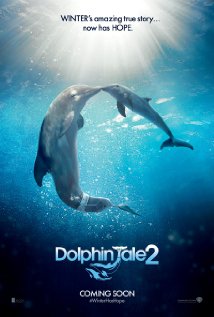
DOLPHIN TALE 2
US, 2014, 107 minutes, Colour.
Harry Connick Jr, Nathan Gamble, Ashley Judd, Kris Kristofferson, Cozi Zuehlsdorff, Charles Martin Smith, Bethany Hamilton.
Directed by Charles Martin Smith.
One quick way for a reviewer to save time with Dolphin Tale 2, would be to dig out the original review of Dolphin Tale. The same characters turn up in this sequel. The plot is just a variation of the original, pleasant, easy, though an appeal to sentiment because of dolphins getting old and dying, clashes between dolphins, and the difficulty in fulfilling all the regulations and the danger of being closed down.
Once again, there is a loving concern about the dolphins, to rescue, to rehabilitate them, to release them – a motto for the centre, repeated during the film which is managed by Clay, Harry Connick Jr, with Sawyer, Nathan Gamble, a bit older, as the young man responsible, with some other teenagers, for the life and rehabilitation of the dolphins. And there are some romantic touches in the background.
There is actually a new dilemma. Kyle is so good at his work that he is being offered a scholarship, to work as an intern and learn more about dolphins. While this seems to be a no-brainer to some of the characters, Kyle is so attached to working with the local dolphins, especially when an old one of them dies and a new one comes in but is not able to work in a pair, and the centre is threatened by a fussy bureaucrat (played by the film’s director, Charles Martin Smith), Kyle is reluctant to go and take the whole film to make up his mind.
Kyle’s mother is always there, played by Ashley Judd. Morgan Freeman comes again for a visit and gives Kyle some sound advice. Kris Kristofferson, pleasantly crusty, is there again as Clay’s father, offering advice from the older generation.
All in all, for audiences who enjoyed Dolphin Tale, it will be a pleasure for them to renew acquaintance with the characters, to learn a little more about the dolphins and more serious rehabilitation and release rather than exhibitions and exploitations at Sea World’s (the theme of the impressive documentary, Blackfish, of some years ago).
It is obviously a film designed for family audiences and has the value of encouraging children and teenagers to become involved in outdoor activities and concern for nature.
1. An enjoyable dolphin story? The importance of the first film, establishing the characters, the aquarium for the dolphins, the issue of training dolphins? For the trainers? For the public?
2. The Florida setting, Tampa, homes, the aquarium? The pools for exhibition? For training? The musical score?
3. The focus on Sawyer, growing up, his age, experience with the dolphins, the relationship with his mother, with Kyle, working with Hazel and not noticing her attraction? Working with Clay, the relationship, the other members of the staff? His work with Panama, bonding, able to train? Panama and her getting old? Mandy and her swimming with Winter? Winter agitated, biting Sawyer? The appeal about Mandy, the young trainers and their anxiety, arguing with Clay, her being released? Further training of Winter? The arrival of Hope? The visitor coming to the performance, offering the scholarship, his not being able to make up his mind, the influence of his mother? The visit of Dr Cameron Mc Carthy, giving him the watch, the allegory of the box, going beyond the box? His final consent, discussions with Hazel, with Clay, the final party, his sitting outside? The tensions with Winter and Hope? Success?
4. Sawyer’ mother, the work and nursing, love for her son, encouragement?
5. Dr Cameron Mc Carthy, past expertise, his good advice, at home at the aquarium, amazed at the dolphins, the final success?
6. Clay, the establishment of the Institute, for rescue, for rehabilitation, for release? The tough decisions? His tensions with Hazel? Her being upset with him? His relationship with his father, good advice from his father? The visit of the Inspector, the difficulties, the 30 days? The visitor and his return and satisfaction at the improvement? The institution boss, concerned about the public, putting pressure on Clay about the dolphins? His parenting, dealing with Hazel, giving her responsibilities, the final decisions with him?
7. Hazel, her father, her age, looking devotedly at Sawyer, wary about his eye for the other girl?
8. The portrayal of the dolphins, the qualities, talking about their intelligence, their communications, companionship, swimming with each other? Panama, the old veteran and energy giving out? Winter, the loss of the tail, swimming without it? The aggression? The loss of Mandy? The initial distrust of Hope? The final acceptance, with the wearing of the tail? Mandy, the little girl seeing Mandy, the details of the rescue, insertion in the pool, the treatment, the sunburn, the x-rays? The improvement? The need for her to be released? The finding of Hope, trying to pair her with Winter? Ultimate success after her fear about Winter having no tale?
9. The aim of the Institute, not for performance, but for rehabilitating the dolphins and allowing them to go back into the sea?
10. A film for the family, for encouraging youngsters in their knowledge of dolphins, interest in all kinds of nature?
Published in Movie Reviews
Published in
Movie Reviews
Tagged under